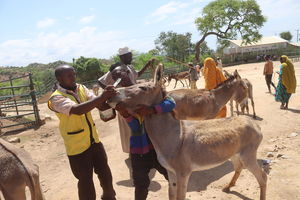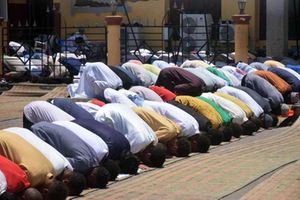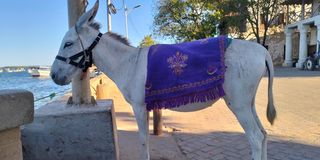
A pampered donkey at the Lamu seafront on March 22, 2025.
On a normal day on Lamu Island, scenes of donkeys being whipped with huge sticks or chains by their handlers would go unnoticed.
Cases of abuse and general mistreatment of these beasts of burden have become largely normalised within the community, leaving them with life-threatening injuries.
The animals are the most reliable means of transport, especially for heavy loads on the island, where vehicles and other modern means of land transport are not allowed into the old town of Lamu, a Unesco World Heritage Site.
However, since Ramadhan began earlier this month, donkeys have been experiencing a different kind of lifestyle. The communities here are predominantly Swahili Muslims of Bajuni origin who are observing their fast.
This, in turn, has allowed the donkeys to receive special treatment and extreme care, all thanks to the observance of Islamic teachings that promote protection of animals.
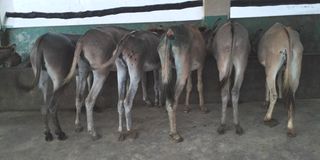
Wounded donkeys receiving treatment at the Lamu Donkey Sanctuary on March 22, 2025.
Furthermore, during Ramadhan, most Muslims on Lamu Island are often indoors with minimal activity, so there is less of a tendency to rely on their animals for daily chores.
This is a rare moment when the donkeys get enough hours of rest in their sheds. The donkeys are also happy to receive all their necessary care and needs such as adequate food and water as well as medical check-ups at the Lamu Donkey Sanctuary.
Mr Said Ahmed Kirume, a donkey owner on Lamu Island, is seen gently patting his donkey with his palms as he 'talks' to it; a far cry from the whipping many donkeys endure on other days.
Other donkeys can be seen with clean, soft cloths on their backs as saddles to ensure they don't feel any pain while carrying people. On normal days, the saddle is always hard, rough and made of mats that usually leave the donkeys with bruises.
Mr Kirume says he always strives to meet the needs of his animals.
However, he admitted that through the teachings during Ramadhan, he has also learnt the need to spend more time with his donkeys by talking to them, loving them and caring for them.
“Let’s be taking great care of our animals by feeding, treating and allowing them to rest whether it’s before, during and after Ramadhan as that’s what our Allah (God) wants,” said Mr Kirume.
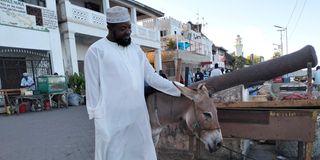
Said Ahmed Kirume talking to his donkey and pampering it on March 22, 2025.
Mr Said Hussein, another donkey owner in the Mkomani area of Lamu Old Town, said he had previously not taken animal welfare and protection issues seriously.
But through Ramadhan sermons in mosques, he has learnt that one should not only be kind to animals but also try to respect their feelings.
“In fact, Prophet Muhammad’s biography and hadiths are replete with examples demonstrating his concern for animals, his explanation of their rights, and his emphasis on treating them kindly. He was indeed merciful to all things, whether human, animal, or inanimate,” said Mr Hussein.
Statistics from the Lamu Donkey Sanctuary Office reveal a bizarre trend of abuse of the beasts of burden across the archipelago.
Lamu Donkey Sanctuary Lead Harness Officer Amos Parsimei said his office was receiving at least 25 cases of abused donkeys a day before the start of Ramadhan.
Mr Parsimei said such donkeys always required urgent medical attention, mostly for bruises and wounds caused by frequent beatings, overloading or poor harnessing.
He expressed satisfaction that since the start of Ramadhan, the number of cases has drastically reduced by more than 50 percent.
“Before Ramadhan, we used to receive between 20 and 25 cases of serious wounds and injuries inflicted on donkeys daily. But during this period of Ramadhan, cases of abuse have gone down. We receive between eight to 10 cases of donkey mistreatment per day. The injuries inflicted aren’t even that serious. They’re harness-related wounds emanating from poor harnessing,” said Mr Parsimei.
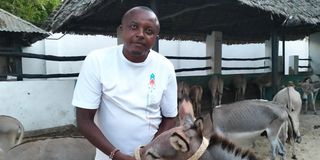
Lamu Donkey Sanctuary Lead Harnessing Officer Amos Parsimei at the sanctuary on March 22, 2025.
He said the Lamu Donkey Sanctuary has started educating donkey owners on how to properly handle their animals, including the use of improved harnessing that prevent the animals from being injured while carrying out their daily chores.
Mr Abdulkadir Mau, a Muslim cleric and elder in Lamu Island, noted that Islam has always taught about the relationship between humans and animals, especially the balance between profiting from them and showing them mercy and kindness.
Mr Mau said this was evidenced by the fact that several Surahs in the Quran itself are named after animals. They include Al-Baqarah (The Cow), Al-An’am (Camel), Al-Nahl (Bees), and others.
He insists that the Quran honours animals and explains their benefits and place on earth alongside humans.
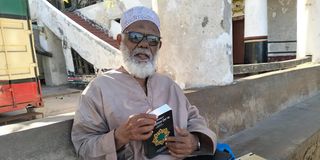
Lamu Cleric, Ustadh Abdulkadir Mau, in this photo taken on March 22, 2025.
Mr Mau noted that during the Ramadhan period, Muslims and the general population of Lamu are constantly reminded to take good care of their animals, including donkeys, or else the faithful will be breaking the laws or regulations of their religion.
This awareness is specifically raised during the frequent Ramadhan sermons, also known as 'Khutbah', in the various mosques.
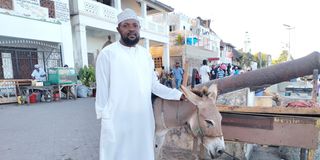
Said Ahmed Kirume on March 22, 2025.
Mr Mau urged Lamu donkey owners not to wait until Ramadhan to do something good for their animals.
“The cruelty meted on donkeys by their handlers here in Lamu is unimaginable. But all of a sudden, and especially during Ramadhan, you’ll observe the same people now turning to be kind and extremely good to their animals as part of practicing the Quran teachings about being kind to animals,” said Mr Mau.
“Some of the owners can’t beat the animals as they lack the energy to do so due to fasting. But I would advise them not to wait until Ramadhan to treat their animals with care. Let them make it a habit to ensure the welfare of the animals are met as that’s what Islam agitates for.”
Lamu Donkey Sanctuary Senior Veterinary Officer, Obadiah Sing'oei, appealed to donkey owners and handlers to take care of their animals and stop mistreating them.
He also urged Lamu residents to take advantage of the free medical services offered by the sanctuary and bring their donkeys for treatment and check-ups.
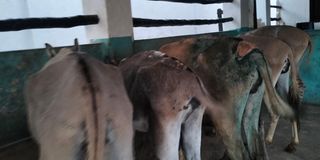
Wounded donkeys receiving treatment at the Lamu Donkey Sanctuary on March 22, 2025.
Referring to Ramadhan, Mr Sing'oei commended the various Islamic teachings offered in mosques and barazas that have helped address the plight of donkeys in the county.
He said the sanctuary was in the process of launching an outreach programme that will see Muslim clerics visiting various places in Lamu to educate locals on the importance of caring for their animals.
“We’re happy that Ramadhan has emphasised the need for residents to ensure their animals get all the care they need. This has helped to bring down cases of donkey abuse that have been rife in this place in previous months. The Donkey Sanctuary has also been at the forefront in ensuring donkey rights and protection is upheld,” said Mr Sing’oei.
The Lamu Donkey Sanctuary was established on the island in 1987 and has now been in operation for 38 years.
Part of its mission is to provide free care to sick, orphaned, old and abandoned donkeys.
Like a hospital, the sanctuary provides both in-patient and out-patient services for donkeys, depending on the veterinary diagnosis of each animal brought to the facility.



